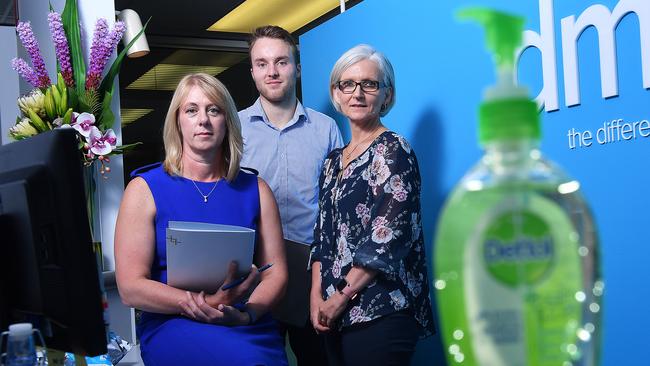Coronavirus poses business, legal risks to SMEs
Small businesses are being faced with disruptions to operations and uncertainty over employment laws as the response to coronavirus ramps up.

SA Business
Don't miss out on the headlines from SA Business. Followed categories will be added to My News.
- Coronavirus a rising risk for Australian businesses
- How to get the most out of your Advertiser subscription
Navigating complex employment laws is emerging as one of the biggest challenges facing small and medium-sized businesses affected by the coronavirus outbreak.
Since the onset of the health crisis in December, employers of all sizes have taken steps to limit the risk to their staff, including banning travel and encouraging employees to work from home.
However, NDA Law employment lawyer Thea Birss says the unprecedented events of recent weeks continue to cause much confusion.
“It’s difficult territory at the moment as workplace laws haven’t factored in a national pandemic where the government is actually ordering people to self-quarantine for two weeks,” she said.
“This is particularly hard for smaller businesses who don’t have capacity to cope with these kinds of situations – having a large proportion of a workforce off on leave costs a lot of money and is a real risk to operations.”
Ms Birss says it’s likely healthy workers under self-isolation can legally be ordered by their employers to take unpaid leave, unless they can work from home or take other measures to perform work safely.
However, that opens up the risk that workers ignore self-quarantine orders.
“This creates a very real WH&S issue for employers – it’s their responsibility to run a safe workplace,” she said. “It’s a real conundrum.”
In addition to staffing issues, SMEs are facing a number of other challenges, including disruptions to supply chains and a slump in consumer confidence and spending.
Accounting firm dmca advisory employs 17 staff members at its Kingswood offices.
Director Tania Tonkin says the firm has taken a series of “common sense” steps to limit the risk to employees, including having more hand sanitisers in work areas, reminding staff not to shake hands and enhancing office cleaning routines.

“We are also ramping up our work from home policies and making sure the right technology is in place for any of our staff to work seamlessly if they have to self-isolate,” she said.
“We already use Skype for many meetings with regional clients so we are pretty used to working like that.”
Ms Tonkin says the firm is seeking advice on how to handle possible quarantine periods.
“That can be complicated in terms of leave as our office is just less than 20 people,” she said.
“Having a lot of people off sick at one time wouldn’t be a great scenario. I suppose if things really got dire, staff could be asked to take some of their paid leave if they didn’t have any sick leave available.”
William Buck SA managing director Jamie McKeough says proactive SMEs that have initiated contingency plans are best placed to weather the storm.
“Is your business equipped for staff to operate remotely or what contingencies are in place in the extreme situation of workplaces being shut down for a period?” he said.
“It’s also a time to review supply chain dependencies and whether the trend of just-in-time supply for manufacturers is still relevant to your business, particularly if you are reliant on Chinese suppliers.
“Are there alternative short-term supply options to investigate, or if not, how are you explaining disruptions to your customers in order to maintain a long-term relationship?
“Interruptions or expected interruptions on sales may require a revision of cashflow projections and a proactive discussion with the bank if the need arises.”
Commonwealth Bank last week became the latest major bank to say it would allow small business customers affected by coronavirus to delay loan repayments and avoid fees.
NAB, Westpac and ANZ have implemented similar measures in recent weeks.
The Federal Government unveiled its $17 billion stimulus package last week, including a suite of measures to support small businesses.
Businesses with an annual turnover up to $50 million will receive up to $25,000 in employment tax relief, and there will be a 50 per cent wage subsidy for apprentices, delivering up to $21,000 per apprentice to employers.
The instant asset write-off will be temporarily increased from $30,000 to $150,000 for businesses with annual turnover up to $500 million, and a 50 per cent accelerated depreciation deduction over and above existing deductions has been made available until June 2021.
Workskil Australia chief executive Nicole Dwyer says the extra support for apprentices is a “well-targeted initiative”.
“We’re already starting to see a retraction in job vacancies across industries bearing the brunt of the COVID-19 fallout, however the knock-on effect of actual job losses is yet to really emerge,” she said.
“Apprentices are often most at risk of losing their job during difficult economic times. Providing financial incentives to help keep apprentices in work is an investment in
the people and skills we need now and into the future.”

